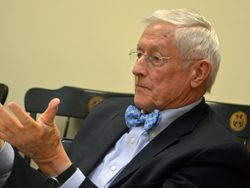 In the days since NEBHE convened hundreds of educators and opinion leaders in Boston for the University Unbound conference, we’ve received a surge of reactions including this one from George McCully, founder of the Catalogue for Philanthropy.
In the days since NEBHE convened hundreds of educators and opinion leaders in Boston for the University Unbound conference, we’ve received a surge of reactions including this one from George McCully, founder of the Catalogue for Philanthropy.
NEBHE has begun focusing the attention of New England institutions on the MOOC movement, which will affect them all. Already, within months of their public debut, MOOCs and related “disruptive” models are widely considered to be global game-changers in higher education. The urgency signaled by the NEBHE conference title, “The University Unbound: Can Higher Education Compete and Survive the Age of Free and Open Learning?” is fully merited. Some have seen this revolutionary transformation as comparable to the Scientific Revolution of the 16th-17th centuries, or the introduction of printing in the 15th-16th centuries, producing what may be the most rapid, powerful and profound paradigm-shift in the history of Western thought, especially as it relates to the rest of the world.
The key to this striking vision is that MOOCs (massive open online courses) promote modern STEM culture electronically and instantaneously, free of charge, in English, to every corner of the globe, to everyone on Earth with access to the Internet and the desire, will and capacity to utilize it. Nothing like this has ever happened before in cultural history, and its effects—in empowering hundreds of millions of people with useful knowledge and skills to become more fully productive—are incalculable but certainly world-changing. Everyone in, or interested in, higher education, would do well to give that at least a moment’s thought.
As for the NEBHE conference itself, one take-away for me was how it demonstrated our need to articulate more precisely what is happening, so that we might more effectively understand, strategize and evaluate this transformation and its parts as they proceed.
What MOOCs demonstrably do best is knowledge-development and skills-development—that is, technical training, certification and accreditation. No other system has shown greater power and promise in these areas than MOOCs.
But that is not the same as self-development, which is to say, education. To be sure, self-development necessarily includes knowledge- and skills-development, but beyond those it focuses on character-development—of personal values, life-experience, qualities of feeling (empathy, sympathy) sensitivity and insight, inspiration and aspiration, interest and concern, love and commitment, inter alia.
We do not yet know how, or how much, MOOCs will accomplish these. EdX is committed to researching the limits and competencies of MOOCs in “education,” but I did not hear at this conference a clear articulation of precisely what that means, and in particular whether the traditional distinction between training (at which MOOCs are unquestionably superior) and education (at which MOOC competency is unknown) is informing that inquiry.
One handle on this challenge is that whereas knowledge- and skills-development (training) can be (with modern IT) a mechanical process, self-development (education) must be a substantially social and intensely personal process. Centuries of residential “higher education” have taught us that the myriad personal and social experiences to which college and university communities are conspicuously conducive, are essential in education. Does this mean that MOOCs cannot educate? Not at all—where computers and the Internet may be engaged in education is in their capacities for communication, and especially interpersonal communication between students, and between students and faculty (as distinct from publishing or broadcasting).
If so, where MOOC research might initially focus is on the kinds and intensities of personal communication that are and can be achieved in these courses and their various modalities (chat rooms, etc.). MOOC courses might be considered “educational” insofar as they promote interpersonal experiences in their requisite knowledge- and skills-development.
What about specifically liberal education? While MOOC experiences in STEM disciplines may certainly be self-developing as well as knowledge- and skill-developing, liberal education must include more than token exposure to, and training in, the humanities—already identified as a field of special interest for MOOC pedagogical research. In Professor Anant Agarwal’s course, intercontinental chatrooms spontaneously arose as students volunteered to answer one anothers’ questions; the distance between these and seminars seems easily traversable, especially with audio-visual teleconferencing. Evaluating students’ written work will be challenging, but only temporarily.
There are many unanswered questions about MOOCs, but none so far that seem unanswerable. Since any institution, not just colleges and universities, might offer MOOCs, and job-qualifying accreditation might occur through course-completion certifications, is the dominance of college and university degrees in accreditation about to be diluted, or to evaporate entirely? What will this “unbinding” of universities mean for the departmental system, as well as for the future of academic disciplines?
Paradigm-shifts are serious processes. The stakes are huge, and they have winners and losers. NEBHE, whose constituents are all stakeholders in the MOOC movement, has with this conference demonstrated its excellent suitability as a leading forum—perhaps annually—for monitoring and measuring MOOC progress.
[ssba]
